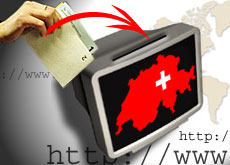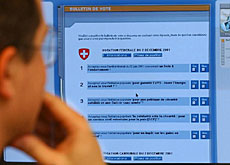E-voting brings new potential to Swiss elections

Switzerland's first vote via the Internet passed successfully, with considerable enthusiasm shown on Sunday in the town of Anières in canton Geneva.
But the vote has raised several questions about the future of democratic elections in Switzerland.
In particular, there are fears about the potential security risks of using the Internet to register a confidential vote.
According to the authorities, a computer hacker working by trial and error has a one in five billion chance of getting into the system used in Anières.
The system consisted of a mixture of pass codes and personal questions designed to build a sufficient defence against anyone trying to access a voter’s details illegally.
Each registered citizen received a 16-digit pass code in the post, which they needed to access the system. They then had to input another pass code and answer a number of personal questions before they were able to vote.
To ensure that hackers could not access the system, the authorities in Geneva asked Hacknet, a company that uses hackers to test online security systems, to try to enter it.
They failed to do so, despite having six weeks to try, instead of the two they would have in reality.
The security system is also closely guarded: Geneva’s authorities control the system and it will not be used elsewhere.
Benefits
The main aim of e-voting is to offer an alternative means of voting. But it is particularly expected to improve voting from overseas, which is currently limited to the slow process of mail correspondence.
Gabrielle Keller, spokeswoman for the Organisation of the Swiss Abroad, says e-voting should appeal to Swiss people overseas, who often find voting by correspondence time-consuming.
“Swiss people who live in countries a long way from Switzerland often receive their voting material very late and don’t have the time to read it through thoroughly,” Keller told swissinfo.
“And when there is a second round in an election, many of them are not even included in the voting.”
However, it is not known how many Swiss people living overseas have access to the Internet.
In Switzerland, the e-voting system proved popular with people who often abstain. In the Anières election, two citizens out of three voted, up from the usual one in two.
The convenience of e-voting seems to have encouraged usual abstainers to vote. Some 22 per cent of the e-voters in the Anières election are occasional or regular abstainers, with most of them saying they would regularly use e-voting if introduced.
In particular, the e-vote method was popular among young people, who often abstain from voting, but who are regular users of the Internet. It also proved popular with people who have limited mobility.
Political uses
Michel Chevallier, spokesman for the e-voting project in canton Geneva, says there are other ways the Internet can be used to involve people more in Swiss politics.
“The government’s vision is to use the Internet not only for voting, but also for gathering signatures on referendums and initiatives,” Chevallier told swissinfo.
Gathering signatures for a people’s initiative or a referendum plays a key part in Swiss politics – anyone can influence a political decision by gathering the required number of signatures and forcing a nationwide ballot.
But it is losing its appeal, as the Swiss become less inclined to go to polling stations and make their voices heard. In Geneva, for example, only five per cent of voters turn up at stations to vote, making it difficult for anyone trying to gather tens of thousands of signatures.
Chevallier believes that the ease of using the Internet could reverse the decline and encourage the Swiss to get involved in more aspects of politics. He sees the enthusiasm with which e-banking has been taken up in the country as an encouraging sign.
“The Swiss don’t like to buy over the Internet, but they often use e-banking,” he said. “They are not worried about their personal details being online.”
Test ground
The government has also mandated the cantons of Zurich and Neuchâtel to test e-voting, but they are not as advanced as Geneva.
A budget of SFr30 million ($21.8 million) has been allocated by the government for the period 2000 to 2004 for the development of electronic government systems, with part of the sum reserved for e-voting.
swissinfo, Andrea Tognina (translated by Joanne Shields)
The first Internet vote in Switzerland took place on Sunday in Anières, canton Geneva.
According to the authorities, a hacker has one chance in five billion of entering the system without the required pass codes.
E-voting is expected to appeal to Swiss voters overseas, to regular abstainers and to those who have limited mobility.
The government plans to expand the scope of e-voting to citizens’ other political activities, such as signature gathering.
The cantons of Zurich and Geneva have also been mandated to test e-voting.

In compliance with the JTI standards
More: SWI swissinfo.ch certified by the Journalism Trust Initiative

You can find an overview of ongoing debates with our journalists here. Please join us!
If you want to start a conversation about a topic raised in this article or want to report factual errors, email us at english@swissinfo.ch.